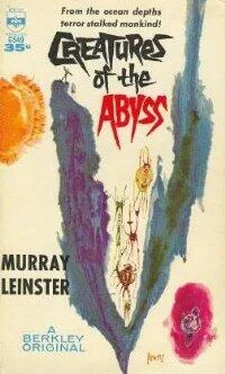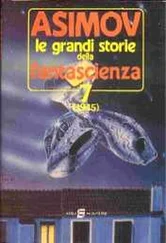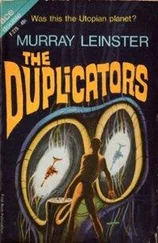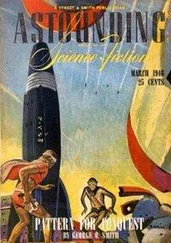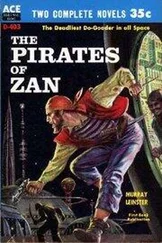He switched on the recorder again. The tape-reel began to spin. The sound went out underwater from the horn. Underwater it was much louder than when it had been received by the Esperance’s microphone. Here it was confined by the surface above and the harbor-bottom beneath. It must have been the equivalent of a loud shout in a closed room—only worse.
The fish in the harbor of Barca went mad. All the harbor-surface turned to spray. Creatures of all sizes leaped crazily above the surface, their fins flapping, only to leap again, more frantically still, when they fell back. A totally unsuspected school of very small flying fish flashed upward in such frenzied haste that some tried to climb too steeply and fell back and instantly flung themselves into the air again.
Terry turned off the playing recorder. The disorder at the top of the water ceased immediately. But he heard shrill outcries. Children had been wading at the edge of the shore. They stampeded for solid ground, shrieking. Where their feet and legs had been underwater they felt as if a million pins and needles had pricked them.
Something flapped heavily on the Esperance’s deck. Tony went to see. It was a three-pound fish which had leaped clear of the water and over the yacht’s rail to the deck.
Tony threw it back into the water.
“I guess there’s not much doubt,” he said painfully.
“Of what?” demanded Terry.
“Of what… I had guessed,” said Tony.
“And what did you guess?”
Tony hesitated.
“I guess,” he said unhappily, “that I’d better not say.”
He watched with a startled, uneasy expression on his face as Tony put the apparatus away.
Time passed. Davis and Deirdre had been ashore over an hour. Then Terry saw the small boat leave the shore and approach. It came deftly alongside, the two passengers climbed up to the deck, and all four crew-cuts hauled the boat back inboard and lashed it fast.
“Our dredge isn’t ready yet,” said Davis. “It looks good, but there’ll be a delay of a few days.” Deirdre examined Terry’s expression. “Something’s happened. What?”
Terry told her. Davis listened. Tony added what he’d seen, including the fish that had leaped high enough out of the water to land on the Esperance’s deck.
“After the fact,” said Davis, “I can see how it could happen. But… “ He hesitated for a long time and then said, “This is another case where I’ve been making guesses and hoping I was wrong. And like the others, proof that my early guess was wrong makes another guess necessary. And I dislike the later guess much more than the first.”
He moved restlessly.
“I’m glad you only tried it once, here,” he said unhappily. “We’re due up at Thrawn Island anyhow. You can work this trick out in the lagoon up there. If there’s no reaction to the dredge when we try it, we can try this. But it might be a very violent poke at something we don’t quite believe in. I’d rather try a gentle poke first.”
He turned away. In minutes Nick was belowdecks starting the yacht’s engine, two others of the crew-cuts were hauling up the anchor, and the fourth was at the wheel. Without haste, but with celerity, the Esperance headed for the harbor-mouth and the open sea.
They had their midday meal heading north by west. Late in the afternoon Deirdre found occasion to talk to Terry about Thrawn Island.
“It’s the China Sea tracking station for satellites,” she told him. “Some of the staff are friends of my father’s. It’s right on the edge of the Luzon Deep, and the island’s actually an underwater mountain that just barely protrudes above the surface. There are some hills, a coral reef and a lagoon. It’s also terrifically steep, and you can use the fish-driving device as much as you please without startling any Filipino fishermen.”
“You’ve been there before,” said Terry.
“Oh, yes! I told you a fish wearing a plastic object was caught in the lagoon there. That was when the station was being built. The men at the tracking station fish in the lagoon for fun, and now they’re naturally watching out for more… oddities.”
The Esperance sailed on. The crew-cuts went about their various chores and talked endlessly, among themselves and with Deirdre, when she joined in. Terry felt useless. He trailed the submarine ear overboard and set the recorder to work as an amplifier only. At low volume it played the sounds of things below. He kept half an ear cocked toward it for the mooing sound he’d picked up at the place where the ocean glittered. He heard it again now, and again found it difficult to imagine any cause for it. The sounds uttered by noise-making fish are usually produced in their swim-bladders. The purpose of fish cries is as obscure as the reason for some insect stridulations, or the song of many birds. But a long-continued fish noise would involve a swim-bladder of large size. At great depths, if a considerable cavity were filled with gas, under pressures running into tons to the square inch … Terry could not quite believe it.
He did not hear the mooing sound any more, as the yacht went on its way. Other underwater sounds became commonplace, and he tended not to hear them. From the deck around him, though, he heard arguments about wave mechanics, prospects in the World Series, the virtues of Dixieland jazz, ichthyology, Cope-land’s contribution to modern music, the possibility of life on other planets, and kindred topics. The crew-cuts were taking their summer vacations as able seamen on board the Esperance, but they had as many and as voluble opinions as any other undergraduates. They aired them on each other.
The afternoon passed. Night fell, and dinner was a session of learned discussion of different subjects, always vehemently argued. Later Terry took the yacht’s wheel, Deirdre sat comfortably nearby, and they discussed matters suitable to their more mature status. They were much less intellectual than the crew-cuts. In a few days they developed an interest in each other, but each of them believed this was just a very pleasant friendship.
Eventually, the moon rose. It was close to midnight when Nick bobbed belowdecks and came up with a report that they’d been picked up by the Thrawn Island radar and were proceeding exactly on course. Half an hour later a tiny light appeared at the edge of the sea. The Esperance headed for it, and presently there were breakers to port and starboard, the engine rumbled, down below, and the yacht lifted and fell more violently than ordinary. Then once more she was in glassy-smooth water; the air was very heavy with the smell of green vegetation. Certain rectangles of light became visible. They were the windows of the Thrawn Island satellite-tracking installation.
The Esperance’s sails were lowered and she moved toward the lights on engine power only. There was no movement ashore, though Nick had talked with the island on short-wave.
After a little while the searchlight was put in operation and began to reach out like a pencil of brilliant white light. It darted here and there and found a wharf reaching out from the shore to deep water. The Esperance floated toward it, her engine barely turning over. There was still no sign of activity, except for the lighted windows.
The engine stopped, then reversed, and the yacht drifted gently until it contacted the wharfs snubber-pilings. Jug and Tony jumped ashore with lines to fasten the yacht. Still no sign of life.
“Queer,” said Davis, staring ashore. “They knew we were coming!”
A moving light suddenly appeared in the sky. A fireball, which is an unusually lurid type of shooting star. It came over the tree-tops and crossed the zenith, leaving a trail of light behind it. It went on and on, seemingly slowing down, which meant that it was descending from a very high altitude. Its brilliance became more and more intense, then it dimmed. At this point the fireball seemed to plunge downward. Then its flame went out and only a faint, dull-red speck in motion could be seen.
Читать дальше
